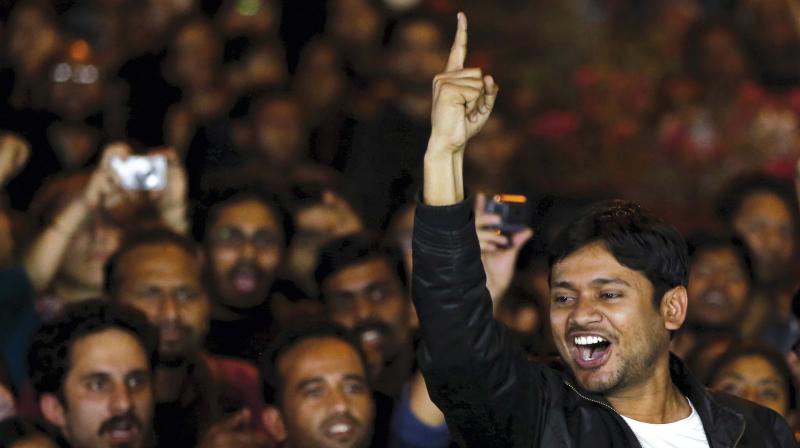Kanhaiya Kumar's stunning political rise is tale well begun
Bhumihar upper caste from Bihar gained wider Dalit acceptance in a stroke of irony.

Importance of Kanhaiya Kumar is his suddenness. One day he was a nowhere guy and the next, he was all over headlines. He is, in fact, a part of political phenomenon witnessed all over the world in the 21st century. Donald Trump, with no political or military background, is the latest example. In India, it started with a bespectacled, wheezy Income Tax official grabbing headlines through persistent use of the Right to Information Act. Then he moved on to anti-corruption bandwagon. Next, you see him as the chief minister of Delhi, not once, but twice. Arvind Kejriwal is the first in recent Indian politics to register a meteoric rise.
Road to political leadership in India — with the exception of N.T. Rama Rao in Andhra — is long and arduous. Political parties with some kind of internal democracy, like the BJP and the CPM, chose leaders invariably factoring in seniority or performance. The Congress sticks no such protocols; they are stuck in dynastic rut. Kejirwal broke this time-tested mould in Indian politics. Suddenly a Johnny come lately steals the limelight. Kanhaiya Kumar is the second example in this burgeoning fraternity. A third one is, Hardik Patil, still in his early twenties, the leader of Patidar eruption in Gujarat.
What makes Kanhaiya’s case interesting is that he is from the communist stable. That too from the CPI, the weaker sibling, always under the shadow of the big brother CPM, ever since they parted ways in 1964. In communist parties’ hierarchy such breakthroughs are unprecedented. Circumstances that led Kanhaiya Kumar capturing national imagination came from outside: a questionable sedition case and brutal ways he was handled by the right wingers and the police. To Kumar's credit, he was quick to capitalise on these.
Kumar busts many stereotypes. First, the communist parties had, as a matter of principle, paid little attention to the Dalit issues, because they feel that that would go against Marxist-Leninist class theory. Communists, caught up in the caste-class binary ignored Dalits, the biggest body of oppressed in the country. The CPM downgrading its representation to a mere MP in an all-opposition-parties senior leaders' delegation to Unah, horrendous scene of Dalit atrocity in Gujarat, is latest in the series of their doctrinarian insensitivity. Kumar is one of the first from the communist ranks to foreground and identify with the Dalit issue. That helped him capture a wider audience; not only from the Left but also from the Ambedkarites.
Irony is that Kumar himself is an upper caste Bhumihar from Bihar; many members of this community had ignobly earned the discredit of biggest perpetuators of atrocities against Dalits. Anti-Dalit militias like Ranvir Sena are seen as Bhumihar outfits. By identifying with the Dalits, and also on being accepted by a large section of them, Kumar succeeded in breaking casteist myth that you have to be one of them to speak for them. He raised a catchy slogan not heard in India before: Lal Salam, Neel Salam; that is red salute of communists along with blue salute of the Ambedkarites. Being a Bihari might have helped his political evolution, because there it is not CPM or CPI which is the dominant communist party, but it is CPIML, a party that is in the forefront of fighting for Dalit issues.
Kumar’s idiom of protest was also appealing; no more wearisome processions, dulling hartals or repetitive graffiti, instead singalong slogans and whole night vigils — some of these methods were also employed by the early Kejriwal. He and his friends’ youthfulness versus brutality of his middle-aged right-wing attackers, raised visions of perennially favourite narrative of David and Goliath.
Kumar is a stunning political star rise of 2016, but about his durability, only time can tell. In the student protests that overtook European capitals in the 1960s, many charismatic young leaders like Tariq Ali, Rudy Dutschke etc., caused quakes that registered high in political Richter scale, only to fade away as time rolled on. Kumar’s is, nevertheless, a tale well begun.
(N.S. Madavan is a former bureaucrat and author)

